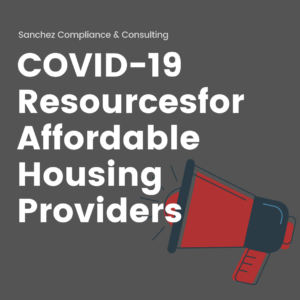Keeping up with all the rules for affordable housing can feel overwhelming, can’t it? If you’re managing low-income housing, you understand the pressure. You’re juggling tenant needs, property upkeep, and a mountain of compliance paperwork; this is where ongoing education in low income housing compliance becomes critical.
It’s easy for things to slip through the cracks. We’ve seen it all in our 20 years here at Sanchez Compliance & Consulting – good property managers running into trouble with specific state verification rules, inadvertently messing up tenant files, or just not getting the right LIHTC compliance training. This is why consistent ongoing education in low income housing compliance is not just a good idea; it’s essential for survival and success in the affordable housing industry.
You probably got into property management to help people and manage communities, not to become a legal expert overnight. But the truth is, the rules for programs like the Low-Income Housing Tax Credit (LIHTC) are detailed and can change. Sticking your head in the sand isn’t an option if you want to keep your properties running smoothly and avoid serious headaches; this applies to all tax credit properties. This isn’t about just ticking boxes; it’s about making sure your team has the know-how to handle tricky situations correctly, every single time. That’s where we aim to lend a hand, building up your team’s confidence and competence in housing credit management.
Table Of Contents:
- Why Keeping Up with LIHTC Rules is a Full-Time Job (Almost.)
- What Does Good Ongoing Education in Low Income Housing Compliance Look Like?
- The Big Payoffs: Benefits of Investing in Your Team’s Knowledge
- Common Roadblocks to Continuous Learning (And How to Jump Them)
- Building a Culture of Compliance Through Education
- How Sanchez Compliance & Consulting Champions Ongoing Education
- Conclusion
Why Keeping Up with LIHTC Rules is a Full-Time Job (Almost.)
If you’re in the affordable housing sector, you know that the only constant is change. Rules and guidance come from multiple places. You’ve got the Department of Housing and Urban Development (HUD), the Treasury Department (since LIHTC is an income housing tax credit program), and then your own state’s Housing Finance Agency (HFA). Each of these bodies can issue new interpretations, forms, or requirements for the housing tax credit. It can feel like you’re trying to hit a moving target, especially concerning asset management.
Think about it. Just last year, there might have been updates to how income is calculated, or new clarifications on student eligibility, including the nuances of the student rule. What about new guidance on documenting disability status, or changes to the Violence Against Women Act (VAWA) protections? If your team isn’t aware of these, you could unknowingly fall out of compliance. For instance, something as seemingly small as a new form for income verification released by your HFA could, if missed, cause problems down the line, affecting your housing tax program compliance.
And the consequences of not keeping up? They can be pretty severe. We’re talking about potential recapture of tax credits, which is a huge financial hit for owners of credit properties. There could be findings from audits that lead to corrective action plans, fines, or even legal trouble. Beyond the financials, non-compliance can damage your reputation with funding agencies and make it harder to get future projects approved. It really isn’t worth the risk, especially when learning and strong credit management can prevent these issues. Continuous learning means you’re always prepared for the latest audit or review, rather than scrambling at the last minute.
What Does Good Ongoing Education in Low Income Housing Compliance Look Like?
So, what should your team be learning about all the time? Good training isn’t just a once-a-year seminar. It’s about consistently reinforcing key concepts and introducing new information in a way that sticks. It should be practical, giving your staff tools they can use right away for their affordable housing education.
Key Topics Your Training Should Cover
A solid education program will cover a lot of ground, including vital aspects of fair housing. It’s important to make sure all critical areas are touched upon regularly. Here are some of the absolute must-haves for your training agenda:
- Tenant Eligibility and Income Calculations: This is the backbone of LIHTC and the housing credit. You need to know who qualifies, how to calculate income and assets accurately according to HUD Handbook 4350.3 and IRS Section 42 rules, especially concerning the student rule. Mistakes here are very common and very costly, so robust housing education is paramount.
- Verification Processes: How do you prove everything? Every state HFA has its own preferred methods and forms for verifying income, assets, student status, and more. Training should cover these state-specific details, not just general rules, for anyone to become a certified professional in this field.
- Tenant File Management: Complete and organized tenant files are your best defense in an audit. What documents are needed? How long do you keep them? How should they be ordered? Good training makes this process less of a headache and is fundamental for annual compliance reporting.
- Annual Recertifications: This isn’t just a yearly chore; it’s a critical compliance point and part of annual compliance. Training should cover the timelines, notices, and how to handle changes in household income or composition. This includes understanding the nuances of things like the Available Unit Rule.
- Utility Allowances: These need to be accurate and updated regularly, based on HUD guidelines or your state HFA’s method. Incorrect utility allowances can make units effectively unaffordable or lead to non-compliance.
- Physical Inspection Standards: Keeping properties in good shape is vital. Staff need to know about REAC (Real Estate Assessment Center) standards or, if applicable, UPCS (Uniform Physical Condition Standards). This helps prepare for inspections and maintain decent, safe, and sanitary housing.
- Fair Housing Laws: This is huge, covering critical fair housing principles. Your team needs deep and ongoing training on the Fair Housing Act, including recent guidance on things like reasonable accommodations for persons with disabilities, and avoiding discrimination based on source of income if your local jurisdiction covers that. The HUD Fair Housing site is a good resource for basics, but specialized training is often needed.
- Reporting Requirements: What do you need to send to your HFA, investors, or syndicators, and when for compliance reporting? Missing these deadlines or submitting incorrect data can cause big problems with your income housing tax program.
This list might seem long, but each piece is a critical part of the compliance puzzle. Breaking them down into manageable training chunks is fundamental to effective affordable housing education. This systematic approach ensures comprehensive understanding and application of complex rules.
Different Ways to Learn and Stay Updated
Luckily, there are many ways to get this crucial continuing education. Not everyone learns the same way, so a mix of methods is often best. It’s about finding what works for your team’s schedule and budget to stay informed in the affordable housing industry.
Consider industry seminars and workshops; these often serve as a leading source for detailed information. These can be great for deep dives into specific topics and offer valuable networking opportunities with peers. Many organizations offer these, both in-person and, increasingly, online, which can save on travel costs during an education event. Certifications like the Housing Credit Certified Professional (HCCP) or Specialist in Housing Credit Management (SHCM) are valuable for key staff members; becoming certificate holders demonstrates a serious commitment to understanding the program and can lead to ACE certification. Many educational courses are designed for content mastery on single topics.
Webinars and online courses are super convenient for ongoing housing education. Your team can often learn at their own pace, and many providers offer affordable options. Don’t overlook subscriptions to reputable industry publications, email newsletters, and HFA updates. These are great for staying on top of breaking news and policy changes. Working with compliance consultants gives you direct access to experts who can offer educational courses tailored to your specific properties and challenges. A robust education tracking system, perhaps using a continuing education tracking form, can help manage learning progress for each housing professional.
And finally, don’t forget the power of internal team training and peer learning. Having your experienced staff mentor newer team members can be very effective. This method fosters a culture of shared knowledge and continuous improvement within your organization. Utilizing a tracking form for internal sessions can also monitor participation and coverage of essential compliance areas.
The Big Payoffs: Benefits of Investing in Your Team’s Knowledge
Thinking about all this training might make your head spin, especially with budgets and time always being tight. But investing in your team’s knowledge isn’t an expense; it’s one of the smartest investments you can make for your tax credit properties. The payoffs are huge and touch almost every part of your operations. When your staff truly understands the ‘why’ behind the rules, they’re more likely to follow them correctly, benefiting the entire housing industry.
The most obvious benefit is reduced risk for your credit properties. Fewer compliance errors mean fewer scary letters from agencies, fewer (or no) financial penalties, and a much lower chance of credit recapture. This peace of mind is priceless. Beyond risk reduction, well-trained staff are more efficient. They know how to process applications correctly the first time, manage files systematically, and handle recertifications smoothly. This frees up time for other important property management tasks.
Good training also leads to better tenant relations. When rules are applied fairly and consistently because your staff understands them well, tenants are more likely to feel respected. Understanding Fair Housing deeply also helps avoid unintentional discrimination, which can lead to complaints and legal issues. A strong compliance record enhances your reputation with state agencies, investors, and the community. This can make it easier to secure funding for new projects or to refinance existing ones.
And don’t forget your staff. When they feel competent and confident in their roles, their job satisfaction improves. They are more empowered to handle situations effectively, which reduces their stress and can lead to lower staff turnover. Ultimately, all of this contributes to the long-term health and preservation of the affordable housing asset itself. It’s about protecting the mission.
Common Roadblocks to Continuous Learning (And How to Jump Them)
We get it. Even if you know how important education is, there can be real obstacles. Property managers are busy, budgets are often stretched thin, and sometimes, staff just don’t seem very interested in more training, especially if it’s not from a recognized leadership center. But these roadblocks aren’t impossible to overcome. With a little creativity and commitment, you can make continuous learning a reality for your team, ensuring compliance with both federal and local laws.
“We Don’t Have the Time”

This is probably the most common roadblock we hear. Everyone is juggling multiple priorities. But can you afford not to make time for compliance training? The time spent fixing errors or dealing with audit findings is almost always far greater than the time spent learning to prevent them. One strategy is to make training a clear priority from leadership down, potentially involving the executive council in championing these efforts. If managers value it, staff are more likely to as well.
Think about shorter, more focused sessions. Instead of a full-day seminar that pulls everyone out of the office, maybe try weekly or bi-weekly one-hour “lunch and learns” on specific topics. You could also integrate mini-training segments into regular team meetings. Perhaps dedicate 15-20 minutes of each meeting to review a specific compliance point or a recent HFA update. Small, consistent efforts add up.
“It Costs Too Much”

Training can have a price tag, no doubt. But again, you have to weigh that against the potential cost of non-compliance. A single instance of credit recapture can cost tens of thousands, or even hundreds of thousands, of dollars. Suddenly, that $300 webinar doesn’t seem so expensive, does it? There are also many free or low-cost resources available.
Many state HFAs offer free training sessions or materials. Check their websites. Lots of industry experts and organizations also offer free introductory webinars. Focus on the return on investment (ROI). Better compliance, more efficiency, and happier staff all contribute to a healthier bottom line. Think of training as an investment in your property’s future, not just an expense line item. Organizations like the National Affordable Housing Management Association (NAHMA) and its affiliates often provide cost-effective housing education options.
“Our Staff Isn’t Interested”

This can be a tough one. If training feels like a chore, or if staff don’t see how it benefits them directly, they might resist. The key is to make training relevant and engaging. Use real-life examples from your own properties (anonymized, of course) to illustrate points. Make it interactive – ask questions, encourage discussion, use case studies.
Clearly show your staff the “what’s in it for me.” Explain how understanding compliance makes their jobs easier, reduces stress, and can even open up career advancement opportunities, such as those highlighted in the NAHMA Emerging Leaders Learning Series. Leadership buy-in is critical here too. If managers are actively participating in training and championing its importance, staff are more likely to follow suit. Recognizing and celebrating compliance successes, and acknowledging new certificate holders, can also help build enthusiasm and show that the effort is valued.
Building a Culture of Compliance Through Education
Ultimately, ongoing education is about more than just teaching rules. It’s about building a true culture of compliance within your organization, where professional standards are consistently upheld. This means that thinking about compliance and doing things the right way becomes second nature to everyone on your team. It’s not just a department or one person’s job; it’s part of everyone’s mindset, and crucial for reviewing local laws alongside federal ones. Education, perhaps through ELC collaboration, is the foundation for this culture.
When learning is a continuous process, not a one-time event, staff stay sharp. They’re more likely to remember key details and adapt to changes. Encourage an environment where asking questions about compliance is welcomed, not seen as a sign of weakness. Open discussions about challenging situations can lead to better solutions and shared learning. It’s also important to regularly review and update your internal policies and procedures based on what your team learns and any new agency guidance, and incorporate testing to evaluate content mastery.
A strong property compliance system supports this culture. When you have clear processes for file reviews, annual reviews, and addressing potential issues, it reinforces the lessons learned in training. It gives your team a roadmap to follow. And don’t forget to celebrate when things go well. Acknowledging a clean audit or a successfully implemented new procedure helps reinforce the value of everyone’s efforts. It shows that the hard work of staying compliant and continuously learning is recognized and appreciated.
How Sanchez Compliance & Consulting Champions Ongoing Education
Here at Sanchez Compliance & Consulting, we don’t just believe in ongoing education; it’s a core part of how we operate and help our clients achieve excellence in affordable housing management. Our philosophy is rooted in proactive compliance. We’d much rather help you prevent problems through knowledge and good systems than help you clean up a mess after the fact. That’s why robust, continuous learning, often including AHC education principles, is central to our services, supporting every housing professional.
When we do file reviews, it’s not just about finding errors. We explain why something is an error and how to fix it, turning the review itself into a learning opportunity, almost like a session with a certification review board. We conduct tailored training sessions for property teams, focusing on the specific areas where they need the most help or that are most relevant to their properties and state HFA requirements. Our general consulting, a form of management assistance, often involves walking managers and staff through complex compliance scenarios, building their understanding step by step. We don’t just give answers; we help you understand the reasoning behind them.
Our goal is to help you develop a LIHTC program that genuinely works for you – one that is not only compliant but also efficient and sustainable. This always involves empowering your team with the right knowledge and tools, ensuring they are prepared for any review board. We believe that an educated team is your strongest asset in the national affordable housing field. If you’re feeling the strain of keeping up and are ready to get your compliance efforts on the right track, perhaps it’s time for a different approach with a leading source in housing education.
Conclusion
In the sphere of affordable housing, things are always moving, and the rules are always being updated. Trying to manage LIHTC properties without a commitment to continuous learning is like trying to navigate a ship in a storm without a map or compass. The importance of ongoing education in low-income housing compliance simply cannot be overstated, especially for the income housing tax credit program.
It is not just about avoiding penalties; it’s about professional excellence, operational efficiency, and, most importantly, fulfilling the mission of providing quality, stable housing for those who need it most. Organizations like the National Affordable Housing Management Association (NAHMA) provide valuable resources and programs, including the NAHMA Emerging Leaders Learning Series, that support this educational journey. Investing in ongoing education in low income housing compliance for your team, covering everything from the student rule to annual compliance, is truly an investment in your property’s success and longevity and strengthens affordable housing management.
Knowledge really is power when it comes to preventing those costly and stressful compliance pitfalls in the housing credit and overall housing industry. Effective housing credit management and compliance reporting depend on it. This commitment to learning underpins the success of the entire national affordable housing management effort.


